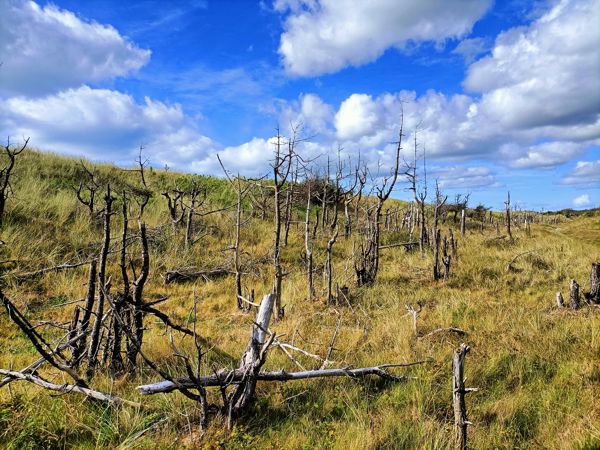Update on work taking place at Newborough

Restoration and management work is continuing at Newborough National Nature Reserve and Forest on Anglesey this autumn.
Work will take place across the site including the restoration of frontal dune grassland and slack habitat at Twyni Penrhos.
Newborough is home to some of Wales’ most precious habitats, supporting a range of rare wildlife such as orchids, amphibians, invertebrates, mosses and lichens.
The Sands of LIFE project, led by Natural Resources Wales (NRW), will carry out the removal of dead conifers along the frontal dunes and the creation of habitat piles - places where wildlife can find safe shelter, especially over the winter months.
Sands of LIFE is a major conservation project currently restoring more than 2,400 hectares of sand dunes, across four Special Areas of Conservation, on 10 separate Welsh sites.
Jake Burton, Sands of LIFE Project Officer for NRW, said:
“Towards the end of October, we will be removing dead Corsican pine from Twyni Penrhos, which will help restore dune grassland and create open areas for spectacular flowering plants to flourish.
“The dead conifers will be moved within Newborough Forest, where habitat piles will be created. Over time, these new habitats will provide excellent homes for mammals, amphibians, invertebrates, and rare fungi to thrive.
“This vital work helps protect and enhance the nature conservation value of Newborough and making sure sites like these are healthy helps us tackle the current climate and nature emergency.”
NRW will also manage a number of conservation projects across the site between October and February which will include scrub management and mowing to restore open areas and rides which support rare species.
The restoration of geological features at Cerrig Duon, Bryn Llwyd and Cerrig Mawr will involve the clearance of fallen timber, brash, bramble and scrub on outcrops to improve the visual presentation and access to this geological resource.
Ynys Llanddwyn, which is part of the national nature reserve, was recently named in the First 100 Geological Heritage Sites list – key geological sites of international scientific relevance - by the International Union of Geological Sciences and UNESCO.
Richard Berry, NRW’s Land Management Team Leader for Newborough, said: “This work forms part of NRW’s remit to maintain and restore habitats and features of importance, and will enhance the quality and conservation interest of the site as a whole.
“It will help enhance and protect the biodiversity, geology and wildlife at the site and provide benefits moving forward.
“There may be some disruption on the site with minor path diversions in places, however, works will be carried out as sensitively as possible to minimise disruption.
“We would like to thank members of the public for their understanding during this period and we will continue to work closely with members of the community and stakeholders on our management of this important, internationally-recognised site.”
